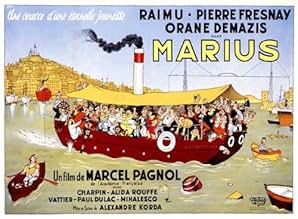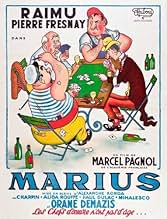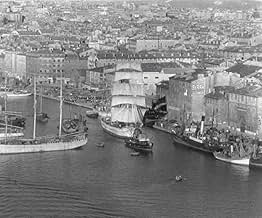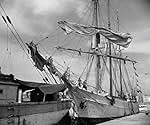IMDb-BEWERTUNG
7,8/10
2764
IHRE BEWERTUNG
Füge eine Handlung in deiner Sprache hinzuMarius is faced with a choice whether to fulfill his passion by sailing the seas or stay and marry the woman he loves.Marius is faced with a choice whether to fulfill his passion by sailing the seas or stay and marry the woman he loves.Marius is faced with a choice whether to fulfill his passion by sailing the seas or stay and marry the woman he loves.
Fernand Charpin
- Honoré Panisse
- (as Charpin)
Alexandre Mihalesco
- Piquoiseau
- (as Mihalesco)
Lucien Callamand
- Le quartier-maître du ferry-boat
- (Nicht genannt)
Zé Digiovanni
- Innocent Mangiapan
- (Nicht genannt)
Milly Mathis
- Tante Claudine Foulon
- (Nicht genannt)
Marcel Maupi
- Innocent Mangiapan le chauffeur du ferry-boat
- (Nicht genannt)
Valentine Ribe
- Un client
- (Nicht genannt)
- …
Empfohlene Bewertungen
I don't know how much new I have to say about this movie that others have not said already. I have watched this movie over and over, I have had the pleasure of teaching it in a French literature and culture course. Every time I watch it I marvel at how well it is done. The acting is uniformly excellent - but then, these actors had performed the play from which this movie was drawn hundreds of times and had been hand-picked by Pagnol. They will definitely strike modern audiences as theatrical, but that is one of the points Pagnol was making about the people of Marseille: they were fond of drama and "performed" in life. The script is clever, and sometimes hilarious. Scenes like 1) César teaching Marius how to make a mandarin-citron (a drink); 2) César, Panisse, Escartefigue, and M Brun playing a round of cards with César cheating; 3) Marius fuming when Panisse makes passes at Fanny in the bar; and many others are even funnier the 10th time than the first. The music is wonderful. In short, this movie is a marvel, full of acting gems. See it!
This movie is extremely similar to the first half or so of the movie Fanny (1961) and in many places it is almost word-for-word. All in all it is an exceptional movie and well worth watching.
Fanny (1962) is a remake that combines this movie and the two sequels, Fanny and César. All are great, though the cinematography and music make the remake a better picture (the trilogy had no music).
Overall, it was extremely well-acted and well-written and I strongly recommend it. However, be forewarned that the videotape by Interama Video Classics is VERY poor quality AND they use white subtitles that are often very hard to read. I don't know why, but nearly EVERY French film from the 1930s I have tried to watch on video is almost unwatchable due to the degradation of the print. I'm not sure why this is, but it could easily turn people away from classics like this movie, and that would be quite a loss.
Fanny (1962) is a remake that combines this movie and the two sequels, Fanny and César. All are great, though the cinematography and music make the remake a better picture (the trilogy had no music).
Overall, it was extremely well-acted and well-written and I strongly recommend it. However, be forewarned that the videotape by Interama Video Classics is VERY poor quality AND they use white subtitles that are often very hard to read. I don't know why, but nearly EVERY French film from the 1930s I have tried to watch on video is almost unwatchable due to the degradation of the print. I'm not sure why this is, but it could easily turn people away from classics like this movie, and that would be quite a loss.
Although a film in subtitles, it easily translates into any language through the universal language of the heart. Pagnol was a strong believer that even though sound was a new and amazing convention in cinematography, it could not be taken advantage of. This belief is readily apparent in Marius. Marius is filled with wonderful dialogue, heartwarming scenes, and emotional relationships. Furthermore, the characters of Cesar and Marius were played to perfection. This film is one that breaks the barrier of time. Even though it may be seventy years old, its themes will universally touch all of those who watch it for ages and generation
This is, of course, the first leg of one of the all-time great trilogies and Londoners were able to see all three - weighing in at a little over six hours - in one day recently. When you know that a given title was made at the dawn of the talkies - in this case 1931 - you go prepared to make allowances if only subconsciously but such is the artistry on display here you soon forget even that and just bask in superb ensemble playing led by the irreplacable Raimu. An Academic writing about 'French' film recently dismissed Pagnol as a 'minor' writer. Yeah, you didn't misread. These are the guys entrusted with the further education of a whole generation. Personally I don't know how many 'minor' writers are invited by the Academie Francaise to join its ranks but Pagnol (who at the time the trilogy was made was the youngest writer to be admitted to this august body) isn't one of them. I shouldn't really write the words Academic and Pagnol in the same sentence because Pagnol is a dirty word in Academe. The reason? He's POPULAR and, by definition, 'accessible' which means that the average Joe can UNDERSTAND what he's saying and where he's coming from thus leaving nothing for the Academics to 'interpret'. Write a book that three people buy and one of them understands about 40 per cent of and you've got it made academic-wise. You'll be 'taught' for years and academics will write books ABOUT your book in inpenetrable jargon that only OTHER academics can understand - it's the written equivalent of a Masonic handshake. So no laurels for Pagnol. So what. This first episode - and each of the three stories is self-contained despite featuring the same locale and characters; Alan Ayckbourn did much the same thing 50 years later with 'The Norman Conquests' - spreads the tablecloth and sets out the banquet; locale: the waterfront, Marseilles; principals; Cesar, the bar owner, Marius, his son, Fanny, the ingenue, in love with Marius, Panisse, the sail-maker also in love with Fanny though 30 years older; supporting characters; Honorine, mother to Fanny, and Claudine, sister to Honorine, Piquoiseau, Escartifigue, Monsieur Brun, light relief. These are the basic threads which Pagnol weaves into a tapestry to rival that of Bayeux. Having set the scene masterfully and introduced us to the characters we get the conflict: Fanny loves Marius, Marius loves Fanny but he also loves the sea and waiting in the wings is Panisse in case the lure of what Gene O'Neill describes as 'dat ol' debbil sea' proves too much. Incredibly the citizens of Southern France, Toulouse, Avignon, etc, though highly intelligent and sensitive still feel bitter and resentful and unforgiving of Pagnol whom they see as someone who portrayed them as little more than buffoons. This first part gives the lie to that accusation. 9/10
Although Marius was primarily written for the stage, Pagnol brilliantly adapted this very theatrical piece to the screen. With the complicity and mastery of Korda's impeccable direction, while talkies were still in their infancy and sound recording was still a challenge, Marius flawlessly delivers high quality dialogues with superb photography of pre-war Marseilles accompanied by a suitable musical score. What is timeless in this masterpiece is the depth of the characters, their emotions, their trials, their flaws and their yearnings, all bathed in the humour unique to Pagnol and the spicy flavour of Southern French. I saw this movie for the first time when I was 9 years old - I was in awe - and for fifty years since have seen it a number of times. I don't think I'll ever grow tired of watching it again and again. A timeless piece!
Wusstest du schon
- Wissenswertes"Asterix and the Banquet", the fifth volume in the popular French "Asterix" comic book series, visually references the film by having a tavern resemble the one in the film and populating it with characters based on those played by Raimu, Fernand Charpin, Paul Dullac, and Robert Vattier.
- Patzer(at around 11 mins) Honorine (Alida Rouffe) is talking with César. She puts her glass on the table, but after a cut, she puts the same glass again on the table.
- Zitate
César Olivier: I was 32 when my rump felt my father's boot for the last time. We knew what love and respect were in those days.
Marius: With a boot up your rear.
César Olivier: And we didn't answer back.
- VerbindungenAlternate-language version of Längtan till havet (1931)
Top-Auswahl
Melde dich zum Bewerten an und greife auf die Watchlist für personalisierte Empfehlungen zu.
- How long is Marius?Powered by Alexa
Details
Box Office
- Bruttoertrag in den USA und Kanada
- 8.262 $
- Eröffnungswochenende in den USA und in Kanada
- 7.720 $
- 8. Jan. 2017
- Weltweiter Bruttoertrag
- 8.262 $
- Laufzeit
- 2 Std. 10 Min.(130 min)
- Farbe
- Seitenverhältnis
- 1.20 : 1
Zu dieser Seite beitragen
Bearbeitung vorschlagen oder fehlenden Inhalt hinzufügen


































